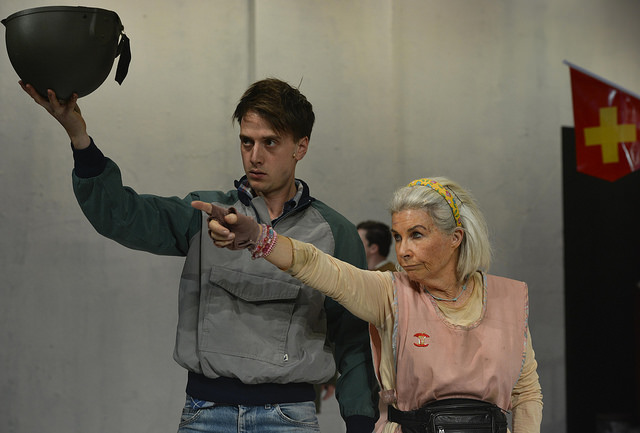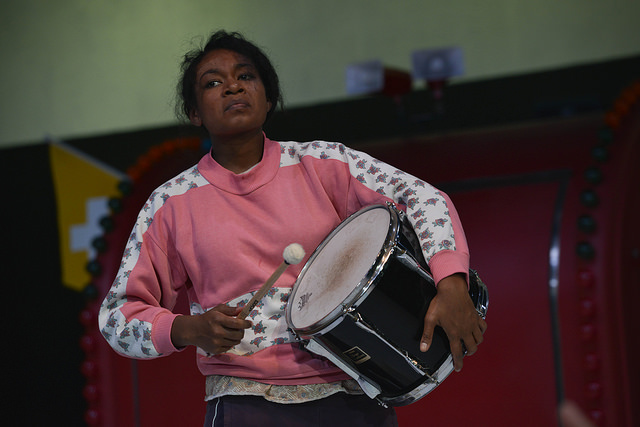This highly anticipated and respectfully Brechtian production falls short of the hype.
Belvoir Theatre, Sydney
June 10, 2015
A famous, iconic work by one of the 20th century’s most hallowed geniuses; an award-winning, dynamic and insightful director; a sharply cast ensemble led by one of the great doyennes of Australian Theatre: it’s little wonder that Belvoir’s production of Bertolt Brecht’s Mother Courage and Her Children, has been the theatre’s most hotly anticipated, and commercially successful venture of 2015. But despite the heaped-on expectation, this production often falls short of the hype.
Traversing a war-ravaged Europe, as political ideologies, religious allegiances, and national borders shift turbulently all around, Mother Courage, with her three children, scratch out a living through their canteen-cum-bric-a-brac shop on a cart. In another universe she would be a devoted mother, but in this world at war she has become a resourceful, opportunistic wheeler-dealer. Mother Courage is both repulsed by, and yet dependent on the destruction and bloodshed around her in order to keep her business flush and support her family. She rationalises her exploitative mindset with moral platitudes, and as her values are eroded by years in the abyss of war, she is slowly robbed of everything she truly values. As a synopsis it’s a deeply compelling story, but the rigour of Brecht’s methodology throws up some unavoidable hurdles.
As a visionary playwright and theatrical theoretician Brecht is a pretty divisive figure. His idea that “Epic Theatre” should be a vehicle for symbolic, moralistic, politically charged narratives rather than merely a pleasing plot, that unnecessary pathos or sentimentality should take a back-seat to rational self-examination, and that a play should be conspicuously artificial instead of seeking to suspend an audience’s disbelief, had an undeniably seismic influence on the course of 20th century theatre – but Brecht is definitely not for everyone.
 Tom Conroy and Robyn Nevin (Photo Heidrun Lohr)
Tom Conroy and Robyn Nevin (Photo Heidrun Lohr)
Love it or loathe it, for me there are two problematic aspects of Brecht’s philosophy that seem to come to bear on this production. Firstly there’s the inextricable connection of Brecht’s ideals to Communism, and one of the playwright’s greatest odes to the destructive corrosion of capitalist thinking is Mother Courage and Her Children. “It might be better not to say this, but you’re watching a Marxist play today,” says Director Eamon Flack’s note in the programme for Belvoir’s production. There are of course universal, human resonances – the horror and hopelessness of war and the resilience of the human spirit – that have an enduring significance, but arguably is a contemporary audience, barely acquainted with the geo-politics of the now-collapsed Soviet states, remotely concerned with the intellectual substance at the heart of this play? Then there’s the paradox of Brechtian emotional detachment, which rubs frustratingly against the grain of why most people attend the theatre: to feel, rather than to think.
It’s this crucial sticking point that has proven most problematic for Flack. Known for productions that are rich in emotional insight, delivering a respectfully unemotive Brechtian performance runs counter to Flack’s theatrical gifts. A talent as unquestionable as Flack’s has of course produced a very serviceable piece of theatre, but it feels incessantly anticlimactic. Even when Flack dares to sail as close to the emotional winds as possible, when we’re on the cusp of genuine pathos, at the last second we’re pulled back into Brecht’s “epic theatre.”
The set and costumes by Robert Cousins and Alice Babidge are also dutiful to the ideals of Brecht. The bare, sanitised walls of the theatre, painted white save for a clearly delineated area for props and instruments, provides a blank canvas where the 11 strong cast, dressed in generic army camouflage, or charity shop cast-offs, evoke the play’s various scenarios using a meagre amount of resources including old garden chairs and waste paper bins. The all-important cart at the centre of the play is extravagantly incongruous, blazing red, completely untarnished and lined with fairground lights. It’s an ingenious nod to both its significance within the narrative and the necessity for the artifice of the production to be unignorable. Benjamin Cisterne’s technically sophisticated lighting also works to force the audience to remain resolutely aware of our theatrical surroundings. The use of bright strobes, delicately choreographed to the dialogue to denote the sudden passing of time is a particularly effective innovation.
Michael Gow’s translation of the official German original is perfectly judged, infusing the text with just the right amount of Aussie slang, contemporary humour and dry wit, and composer Stefan Gregory’s songs have a similarly updated feel while remaining respectfully close to the musical heritage of Brecht’s closest compositional collaborator, Kurt Weill.
In the title role, Robyn Nevin is undoubtedly the biggest draw on the billing, and her performance is largely impressive. She has given great attention to detail to the rhythm and pace of her delivery: every gesture, every intention finely tuned to ensure a precisely measured tempo, and seamless momentum. This is acting at its most technical, but the rigour of the execution clearly takes its toll. Occasional stumbles, or missed cues, which might be easily ignored in another context, are jarringly obvious in this meticulously regimented environment.
 Emele Ugavule (Photo Heidrun Lohr)
Emele Ugavule (Photo Heidrun Lohr)
The rest of the cast deliver excellent performances across the board. Tom Conroy is superb as the self-conscious, stuttering Swiss Cheese, wracked with anxiety and the unshakable weight of duty, as is Anthony Phelan as the Chaplain, but perhaps most remarkable for my money is Emele Ugavule’s Kattrin. As Mother Courage’s mollycoddled dumb daughter, her silent portrayal of Kattrin’s unshakable compassion and personal sacrifice in the face of abject horror was deeply convincing.
Indeed there is much to praise about this production, which is far from a bad attempt at this play. However I can’t help but feel that Brecht, rather than setting us free with his mid-twentieth century theatrical revolution has created a straightjacket, preventing this good production from being great.
Belvoir presents Mother Courage and Her Children until July 26.











Comments
Log in to join the conversation.